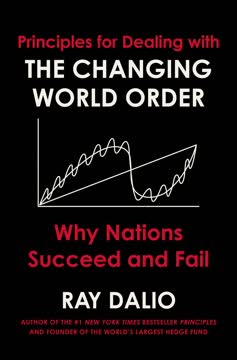Key Takeaways
1. Embrace reality and deal with it effectively
"Truth – or, more precisely, an accurate understanding of reality – is the essential foundation for any good outcome."
Face the harsh truth. Accepting reality, no matter how unpleasant, is the first step towards improvement. This doesn't mean being pessimistic, but rather being a realistic optimist. By acknowledging the truth, you can:
- Identify problems more accurately
- Find effective solutions
- Make better decisions
Embracing reality also means recognizing your strengths and weaknesses. This self-awareness allows you to:
- Leverage your strengths
- Improve or work around your weaknesses
- Seek help when needed
2. Use the 5-step process to achieve your goals
"The Process: 1) Have clear goals. 2) Identify and don't tolerate problems. 3) Diagnose problems to get at their root causes. 4) Design plans that will get you around them. 5) Do what's necessary to push these designs through to results."
Follow a systematic approach. This 5-step process is a powerful tool for achieving any goal:
- Set clear goals: Be specific about what you want to achieve.
- Identify problems: Recognize obstacles that stand in your way.
- Diagnose root causes: Understand the underlying reasons for these problems.
- Design solutions: Create plans to overcome these obstacles.
- Execute and persist: Take action and push through until you achieve results.
This process can be applied to personal goals, business objectives, or any challenge you face. It provides a structured way to approach problems and find effective solutions.
3. Radical open-mindedness is crucial for success
"Radical open-mindedness is motivated by the genuine worry that you might not be seeing your choices optimally."
Challenge your own beliefs. Radical open-mindedness is about actively seeking out different perspectives and being willing to change your mind. This approach:
- Expands your knowledge and understanding
- Helps you make better decisions
- Fosters innovation and creativity
To practice radical open-mindedness:
- Seek out people who disagree with you
- Listen more than you speak
- Be willing to admit when you're wrong
- Constantly question your own beliefs and assumptions
Remember, the goal is not to be right, but to understand what's true and make the best decisions based on that understanding.
4. Understand that people are wired differently
"Understand how you and others are wired, because people's different ways of thinking lead them to different conclusions."
Embrace diversity of thought. People have different strengths, weaknesses, and ways of processing information. Understanding these differences can help you:
- Communicate more effectively
- Build stronger teams
- Resolve conflicts more easily
- Make better hiring decisions
Key points to remember:
- People's personalities are largely determined by their genetics
- Different personality types excel at different tasks
- Diversity in thinking styles can lead to better problem-solving and innovation
By recognizing and valuing these differences, you can create more effective and harmonious work environments.
5. Learn to make decisions effectively
"Recognize that 1) the biggest threat to good decision making is harmful emotions, and 2) decision making is a two-step process (first learning and then deciding)."
Master the art of decision-making. Good decision-making is crucial for success in any area of life. To make better decisions:
- Separate emotions from logic: Recognize when emotions are clouding your judgment.
- Gather information: Seek out relevant data and expert opinions.
- Consider alternatives: Don't just go with your first idea.
- Weigh pros and cons: Consider both short-term and long-term consequences.
- Make the decision: Once you've analyzed the situation, commit to a course of action.
Remember that decision-making is a skill that can be improved with practice. Learn from your mistakes and continuously refine your process.
6. Radical transparency fosters meaningful work and relationships
"Radical transparency brings problems and weaknesses to the surface and allows people to see things for themselves."
Embrace openness and honesty. Radical transparency means being open about everything in your organization or personal life. This approach:
- Builds trust
- Encourages accountability
- Fosters learning and growth
- Leads to better decision-making
To implement radical transparency:
- Share information freely (except when legally or ethically prohibited)
- Encourage open and honest feedback
- Admit mistakes and weaknesses
- Be clear about expectations and performance
While it can be uncomfortable at first, radical transparency ultimately leads to stronger relationships and more effective organizations.
7. Pain + Reflection = Progress
"Pain + Reflection = Progress. If you can develop a reflexive reaction to psychic pain that causes you to reflect on it rather than avoid it, it will lead to your rapid learning/progress."
Learn from discomfort. Pain, whether physical or emotional, is often a signal that something needs to change. Instead of avoiding pain, use it as a catalyst for growth:
- Acknowledge the pain: Don't try to ignore or suppress it.
- Reflect on its cause: What led to this situation?
- Identify lessons: What can you learn from this experience?
- Plan for improvement: How can you use these lessons to grow?
By embracing this formula, you can turn every setback into an opportunity for progress. Remember, the most successful people are often those who have learned the most from their failures.
8. Weigh second- and third-order consequences
"Never seize on the first available option, no matter how good it seems, before you've asked questions and explored."
Think beyond immediate results. Many decisions that seem good in the short term can have negative long-term consequences. To make better decisions:
- Consider long-term effects: Look beyond immediate outcomes.
- Analyze ripple effects: How will this decision affect other areas?
- Seek diverse perspectives: Others may see consequences you've missed.
- Use scenario planning: Imagine different possible outcomes.
Examples of second- and third-order consequences:
- A quick fix for a business problem might lead to more significant issues down the line
- A seemingly beneficial policy might have unintended societal impacts
- A personal decision might affect not just you, but your family and community
By considering these deeper consequences, you can make more robust and beneficial decisions.
9. Cultivate meaningful work and relationships
"Meaningful work and meaningful relationships aren't just nice things we chose for ourselves—they are genetically programmed into us."
Prioritize purpose and connection. Humans are inherently social creatures who crave meaning. To lead a fulfilling life:
In work:
- Pursue tasks that align with your values and strengths
- Seek roles that allow you to make a positive impact
- Continuously learn and grow in your field
In relationships:
- Invest time and energy in deep, meaningful connections
- Be authentic and vulnerable with others
- Support and challenge each other to grow
Remember that meaningful work and relationships are not luxuries, but necessities for a happy and successful life. They provide:
- A sense of purpose
- Emotional support
- Opportunities for personal growth
- Resilience in the face of challenges
10. Evolve or die: Constant improvement is key
"Evolve or die. This is equally true for individuals, companies, and countries."
Embrace continuous growth. In a rapidly changing world, standing still is equivalent to moving backwards. To stay relevant and successful:
- Cultivate a growth mindset: Believe in your ability to learn and improve.
- Seek out challenges: Push yourself outside your comfort zone.
- Learn from failures: View setbacks as opportunities for growth.
- Stay curious: Always be learning new skills and ideas.
- Adapt to change: Be flexible and open to new ways of doing things.
Practical ways to evolve:
- Read widely and stay informed about your field
- Seek feedback and act on it
- Set ambitious goals and regularly reassess them
- Embrace new technologies and methodologies
- Surround yourself with people who challenge and inspire you
Remember, evolution is not about perfection, but about constant adaptation and improvement. The most successful individuals and organizations are those that can learn and change faster than their environment.
Last updated:
Review Summary
Principles for Success is highly praised as an accessible, illustrated version of Ray Dalio's longer work. Readers appreciate its simplicity, visual appeal, and distilled wisdom. Many find it inspiring and useful for all ages, with practical advice on goal-setting, problem-solving, and personal growth. The book's emphasis on open-mindedness, learning from mistakes, and balancing work with relationships resonates with readers. While some criticize its brevity or simplistic approach, most reviewers recommend it as a quick, impactful read that encourages reflection and personal development.
Similar Books










Download PDF
Download EPUB
.epub digital book format is ideal for reading ebooks on phones, tablets, and e-readers.








